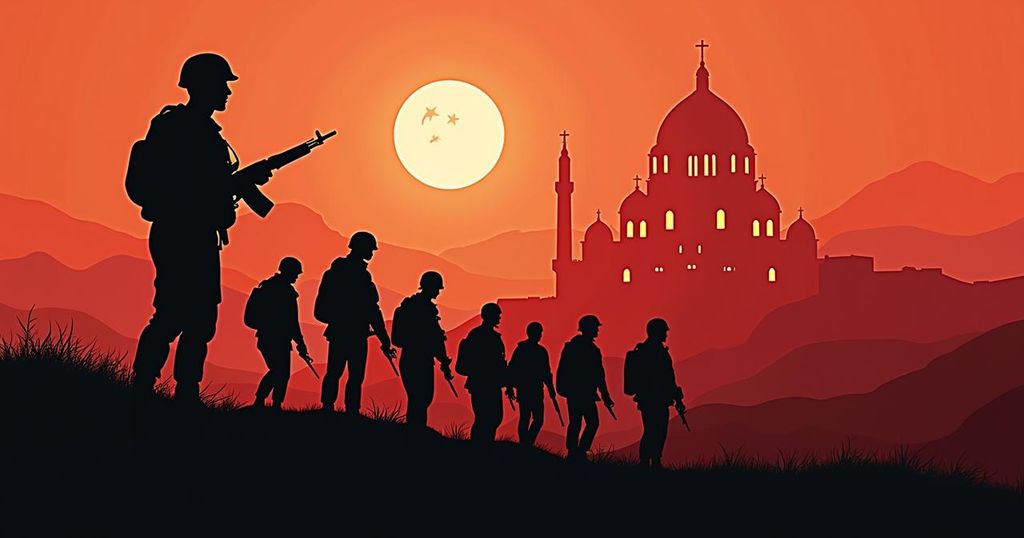Growing Military Influence in Tunisian Politics: Implications for Democracy Ahead of the Presidential Election
The role of the Tunisian military has expanded significantly under President Kais Saied, raising concerns about the implications for democracy as the country approaches a controversial presidential election. Once marginalized in politics, the military’s integration into government may threaten pluralism and democratic integrity, especially given Saied’s reliance on military support.
The political landscape in Tunisia is experiencing a notable shift as the role of the military expands significantly under President Kais Saied, particularly leading up to the contentious presidential election. Once marginalized during the reigns of Presidents Habib Bourguiba and Zine el-Abidine Ben Ali, the military has shifted from a position of relative weakness to one of notable influence, especially after Saied’s electoral victory in 2019 and his controversial consolidation of power in July 2021. President Saied strategically courted the military, recognizing its pivotal role in his ascent to power. This partnership is exemplified by unprecedented appointments of military personnel to governmental ministries, marking a departure from Tunisia’s historical precedent where the armed forces remained separate from political governance. Observers express concern that the increased visibility and authority of the military may forebode troubling implications for the upcoming election, which many perceive as lacking fairness and legitimacy. Historically, the Tunisian army was deliberately kept out of political matters due to the influences of Bourguiba, whose governance model leaned towards civilian oversight, contrasting sharply with the militarized regimes seen in neighboring countries. The military was particularly marginalized under Ben Ali, notably illustrated by the suppression of military dissent in the early 1990s. Post-revolution, the army’s perception transformed when it was associated with the protection of democratic processes. Its involvement in civil order maintenance and electoral oversight began to position it as a guardian of democracy. However, this rise was catalyzed further by the response to terrorist threats in the subsequent years, leading to substantial military budget increases and external military aid, primarily from the United States. In recent developments, as Saied solidifies his regime, reports have surfaced suggesting a complex dynamic between the presidency and military leadership. Saied has utilized the military in curbing dissent while concurrently facing growing friction with military elites, particularly concerning governance and resource management. With a presidential election imminent, the tension between military obligation to protect republican values and potential complicity in authoritarian practices raises profound questions regarding the future trajectory of Tunisian democracy and military-civil relations. Tunisian citizens and observers alike are left to ponder whether the military will uphold the country’s democratic principles or capitulate to authoritarianism; thus, the implications of October 6, 2024, may profoundly impact these dynamics and the nation’s political fabric overall.
Tunisia’s political dynamics have traditionally limited the role of the military in governance, especially post-independence in 1956, due to a historical aversion to military involvement in politics nurtured by leaders like Bourguiba. This changed significantly after the 2011 revolution when the military began to gain popularity as a protector of democratic values. The aftermath of the revolution saw a shift wherein the military began asserting influence by participating in civil order and electoral processes, ultimately becoming a central player in contemporary Tunisian politics, particularly under President Saied, whose reliance on military support has raised alarms regarding the encroachment of military power in civilian governance as the nation approaches a presidential election perceived as fraught with issues of fairness and legitimacy.
In conclusion, the evolving role of the Tunisian military under President Kais Saied signifies a critical juncture in the nation’s political history. As the military’s influence grows, especially with unprecedented ministerial appointments, concerns regarding the integrity of the upcoming presidential election intensify. This scenario poses fundamental questions about Tunisia’s commitment to democratic values and its readiness to confront potential authoritarianism. Observers and citizens alike must remain vigilant as the military navigates its responsibilities in protecting the republic amid political changes that challenge democratic norms.
Original Source: www.middleeasteye.net




Post Comment